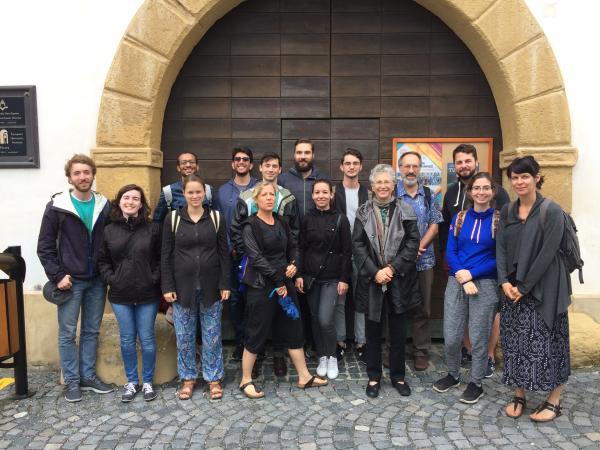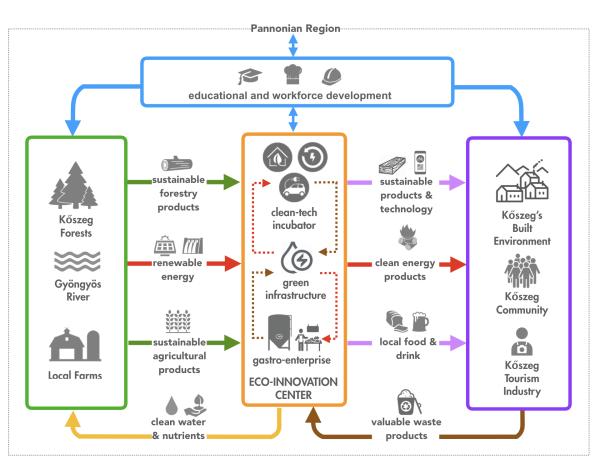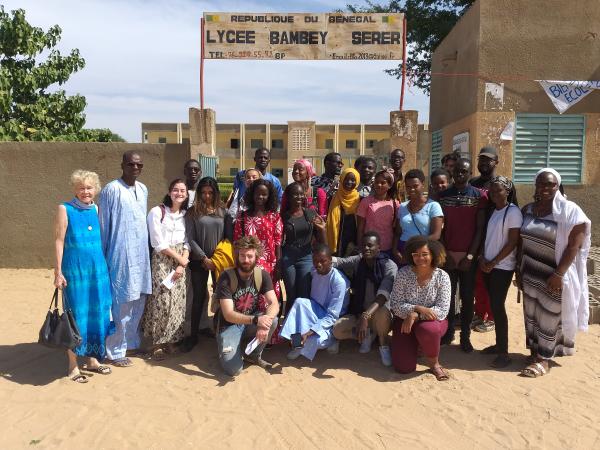
City College students and their Hungarian counterparts with Hillary Brown and Charles Vörösmarty in Kőszeg.

Diagram of circular economy

CCNY and Senegalese students worked on sustainable development and the ecovillage movement
The City College of New York faculty and students recently applied their academic expertise internationally, traveling to and conducting research in Hungary and Senegal.
City College and CUNY students joined Hungarian students last summer in Kőszeg, Hungary, a small, historic northwest Hungary municipality, to undertake a month-long trans-disciplinary research and planning project, spearheaded by Professor Hillary Brown, director of the Sustainability in the Urban Environment master’s program at the Bernard and Anne Spitzer School of Architecture. The teamincluded undergrad, graduate level and Ph.D. students from varying academic backgrounds—hydrology, engineering, sustainability, planning, economics, anthropology, civil engineering, forestry, agronomy and ecology.
Brown and the students worked with faculty from the Institute of Advanced Studies, Kőszeg (iASK), as well as with CCNY’s Charles Vörösmarty, civil engineering professor and director of the Environmental Sciences Initiative at the Advanced Science Research Center, to research a circular economy model and its practical application for revitalizing the economy of Kőszeg and its bioregion.
Kőszeg has been losing population due to a stagnant economy and the ongoing outmigration of its young people to cities, and local labor to neighboring Austria. Along with identifying what is valuable in the community – picturesque Kőszeg has tourism appeal – the team focused on closing-the-loop of or circularizing local resources. The plan promotes reciprocal exchanges of energy, water and material resources among economic and natural resource sectors to advance us beyond the inefficient practices of a linear take-make-waste economy.
The circularized strategy involved students using remote sensing to aggregate local data about crops, watersheds, forests. They then promoted best practices for forestry, water purification, clean energy and related workforce redevelopment. Waste flows are to be recovered for beneficial use in a repurposed industrial park proposed for closed loop production of new products, (e.g. brewery waste to bakery, forest waste to traditional craft, and local food waste to energy).
Some of the students presented their findings to stakeholders in Kőszeg and, in February, the team produced a 140-page, illustrated final report detailing strategies and technologies that would support local and regional resilience. Brown has presented the project at sustainability conferences in Hungary, the U.K., and Portugal.
In January, 2019, Professor Marie Nazon of the SEEK department traveled to Senegal with students from the Colin Powell School of Civic and Global Leadership to engage in a three-week course in sustainable development and the ecovillage movement. Undergraduates, many majoring in International and Black Studies, and some of Senegalese heritage, were joined by two graduate students from the Bernard and Anne Spitzer School of Architecture.
Nazon partners with the NGO Network for Ecovillage Emergence and Development (REDES) in the Sahel region of Senegal, and designed the 4-credit service learning course based on her research experience in Senegal as a Fulbright grant recipient in 2010.
Students were paired with Senegalese students from Cheikh Anta Diop University, and traveled to the village of Bambey Serere outside Dakar, for action-research and service learning. Projects included greening the local high school and middle school; addressing plastic waste by organizing a cleanup involving 600 students; assisting in developing educational methods to improve oral English skills; weighing babies at the local health clinic; and proposing a digital birth records system to the mayor’s office. The Spitzer students provided professional assistance to the design and construction of a high school community room.
The group explored indigenous spirituality and African culture, and took a close look at slavery in Africa and surviving historical trauma during a trip to the Gorée Island slave house. “They came out transformed," said Nazon, "finding themselves.”
About The City College of New York
Since 1847, The City College of New York has provided a high quality and affordable education to generations of New Yorkers in a wide variety of disciplines. CCNY embraces its role at the forefront of social change. It is ranked #1 by the Harvard-based Opportunity Insights out of 369 selective public colleges in the United States on the overall mobility index. This measure reflects both access and outcomes, representing the likelihood that a student at CCNY can move up two or more income quintiles. In addition, the Center for World University Rankings places CCNY in the top 1.2% of universities worldwide in terms of academic excellence. More than 16,000 students pursue undergraduate and graduate degrees in eight professional schools and divisions, driven by significant funded research, creativity and scholarship. CCNY is as diverse, dynamic and visionary as New York City itself. View CCNY Media Kit.